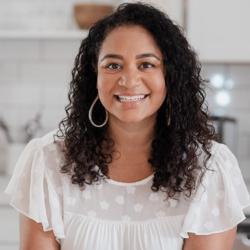Get Good with Money with Walli Miller
You want to get good with money, but where to start? Walli Miller shares her easy to follow process for finding the financial success you desire!
Listen to us On
About the Episode
LifeBlood: We talked about how to get good with money, why so many of us struggle financially, what it means to be wealthy, and how to get started with Walli Miller, Financial Coach.
Listen to learn why getting good with money is simple but not easy!
You can learn more about Walli at FinanciallyThriving.com, Facebook and Instagram.
Thanks, as always for listening! If you got some value and enjoyed the show, please leave us a review wherever you listen and subscribe as well.
You can learn more about us at LifeBlood.Live, Twitter, LinkedIn, Instagram, YouTube and Facebook or you’d like to be a guest on the show, contact us at [email protected].

George Grombacher
Lifeblood Host

Walli Miller
Guest
Episode Transcript
george grombacher 0:12
leopard, this is George G. And the time is right welcome. Today’s guest is strong a powerful wall e Miller Wally, are you ready to do this? Yes, let’s go. Let’s go. Well, he is a financial coach and entrepreneur. She’s the daughter of an immigrant, first generation college student and a self made millionaire excited to have you on while he tell us a little about your personal life some more about your work and why you do what you do.
Walli Miller 0:43
But I thought I was always doing money, right. And it wasn’t until I had an aha moment realized that I was missing a very key component. You know, I was born and raised in the Bronx, which is one of the poorest boroughs, actually, the poorest borough in New York City, came from a low income family, you know, stay at home mom, I’m one of five children. So we didn’t really have a whole lot of money to go around. I didn’t really know that we were poor, because so many of the people around us lived in the same type of situation. But you know, when you sort of look back on things, you can realize, oh, yeah, remember, the lights got turned off a couple times. And there were a few times, although we always had food to eat, it wasn’t, you know, sometimes it was just like rice and maybe like a fried egg or something like that. So, um, you know, we never really had conversations around money. But one of the things that I knew was that stay out of credit card debt, you know, don’t put money on credit cards that you can’t pay off. And in my mind, I was good with money, because I did that. And that was sort of that bar of being good with money. I say that a credit card debt, I did have some student loans. I had a car No. But I was relatively lucky that I got into a career that paid really well. And sort of this is where those that relationship with money, my money mindset really came through because so much of that is formed and shaped, when we’re young, you know, either directly from our parents or the people who raise us, and sometimes indirectly, and like I mentioned before, we really didn’t have a whole lot of conversation about money. And so when I was in my 20s, I realized that came to a point where I realized that I had made quite a bit of money and really didn’t have a whole lot to show for it.
george grombacher 0:00
Come on
Walli Miller 0:37
Yeah, I am a money nerd. And I think I pretty much I’ve always been a money nerd.
george grombacher 2:42
Yeah, I certainly appreciate all that. It’s it’s it’s, it’s, it’s so much right money is so much because it factors into really every aspect of our lives. And there’s so much that’s that’s, that’s wrapped up in it. But you know, to degree not getting into credit card debt, if your folks were going to teach you one thing, that that that was a pretty good one. So as as, as you’ve grown and, and evolved, and now you are helping other people to get to where they want to go with their money. How do you look back on growing up in a place where just everybody around you was in a similar situation? And I’m not sure how old you are? I certainly grew up before the internet was was everywhere. And so we didn’t have Instagram to be looking around and seeing all this affluence. How do you think about that?
Walli Miller 3:41
Yeah, for sure. Millennials Gen Z years, you know, or generation alpha, right? Like, coming up in that age is very different. I mean, because even though we didn’t have Instagram, or Facebook, or even MySpace until I was in, what was it maybe like in middle school, or I think it was in middle school. You know, like, it’s one of those things where right now, everywhere you go, you have the opportunity to compare yourself to other people. Right. And there is definitely a lot to be said about inspiration and being inspired. Wow, he could do it, she could do it. They look like me, that’s really important. But the comparison game can also be kind of dangerous. And I think that this is where when we think about what debt means. And when we think about, you know, sort of that feeling of I need to make sure that I fit in it is very problematic. And you know, I mentioned that I kind of had an aha moment. You know, I don’t know what triggered it if it was the amount of money that I made or if it was a timeframe, but I remember receiving in the mail, my Social Security Administration earnings report, and I think it’s after maybe a decade of work or so. Something like that. But I remember receiving this and I was in my 20s. And it had listed every job that I had ever worked, right. So I had that job that I worked in, during the summer when I was like 14 or 15 years old, all the way to current day. And I added up my total income. And that was when I realized, wow, I made this much money. And I looked around and realized that what I had was a closet full of clothes. You know, I had, you know, piles of shoes. But really, I didn’t have what I didn’t really have a whole lot to show for it, right? It’s except some stuff. And I wish I could say that I valued all the clothes and all the shoes. But really, when I looked at it, I had clothes that still had tags on it. And so that was sort of like one moment where I realized that I needed to do something different. The second thing is I entered into a career where I enjoyed the work that I was doing, I found a lot of fulfillment, I had great work coworkers, until I didn’t write. So I had worked in this same space for a long time, and management changed. And I realized that it went from a couple bad days a week to a few weeks to a couple of months of really not wanting not feeling inspired, not wanting to wake up and go to work in the morning, right. And I realized I didn’t have a whole lot of choice, because essentially, although I wasn’t outspending what I earned, okay. I was essentially living paycheck to paycheck, maybe if one paycheck, I miss that would be okay. But if two paychecks were didn’t hit my direct deposit, I was really in trouble. And that was when I decided to see what was I missing because again, in my mind, I thought I was doing good with money, I put a little bit of money aside in savings, I was paying off my bills, I stayed out of credit card debt. But I realized that I was missing that key component. And that key component was wealth building. And this really kind of relates back to the way I grew up, we just didn’t have conversations about money. We didn’t talk about lack thereof, or abundance or scarcity, or we just didn’t really talk about money. Now. So my parents didn’t teach me how to balance a checkbook. They didn’t teach me, you know, really how to how to how to grow money, how to build wealth, that was a phrase that was very foreign to me. But of course, as many millennials do, I went into the Google world, right? And try to figure it out. How do you build wealth? How could I have financial freedom? How could I retire early? How can I quit my job, and that was when I made some amazing discoveries. And like I said, the first was really understanding that what I was missing was that wealth building piece. So that was sort of my epiphany.
george grombacher 8:04
Nice. I appreciate all that he shared a lot of really, really great stuff right there. I love the sort of thinking I’m not living paycheck to paycheck, but I’m leaving maybe kind of a month a month, sort of a thing where I couldn’t go two weeks or certainly four weeks. With with with without this chuck and from the outside looking at people probably think oh, look, look at me, I’m in my 20s I’m, I’ve got great income and things are going great for me. But then you realize, oh, my gosh, wait a minute. This is not the case. And I need to be changing things. And you had that aha moment. So nice. So what changed? Then? What how was behaviors? Minor? All of it?
Walli Miller 8:48
Yeah, so the first thing that I really needed to do was understand what I was doing with my money. And I realized that I was a little bit of an impulsive shopper. And this is a lot of what so many of my clients kind of come to me at, they make really good money, even six figures, right? But it doesn’t matter if you’re making $50,000 a year or $200,000 a year, if you’re spending every dollar that you make, you’re in the same situation, right? So I was kind of an impulsive shopper, I would go to Target to buy one or two things and I would come out with a cart full, I would be on my way to drive to go put fuel in my car and I would stop into TJ Maxx or Nordstrom Rack or whatever the case might be. And so I really had to sort of discover that because the first thing that I did, and this is what I recommend where people start, although when we think about personal finances, I like for people to Yes, create financial goals, right though there’s some really great milestones, but really decide on the life that you want to live. So have those lifestyle goals first, and then make sure that your spending aligns with what you value most But one of the things that I think is really important is for us to know what our numbers are. Right? Make sure that you know exactly how much money you’re making. Now, this is not your salary, because it doesn’t matter what your salary is, when we think about taxes and deductions. It’s really what is your take home pay? How much money are you actually bringing in? Do you have any side jobs, bonuses, commissions, make sure you really understand how much money you’re bringing in a month. The second thing is to calculate what your expenses are. And I take this in two phases. The first is your absolute needs. So things like food and shelter, and maybe transportation, right? Make sure you calculate the things that you absolutely need. And then figure out how much of your lifestyle how much of those wants really are adding value to you, that you make maybe brings you joy adds convenience to your life, that really makes you feel like you’re living a full life. Now once you have how much money you make and what your true expenses are, see what the difference is see if there is a difference if there’s a surplus, or if you’re kind of in the hole. And so so many people overspend because they really don’t understand or they really don’t know what their income is. Right. So in order to set these financial goals and get clarity on the situation, it’s important to get all of your bills and your banking statements and also take a look to see how what you’re spending money on. So that is sort of like that first step, know your numbers.
george grombacher 11:40
I love it. Such an important thing.
Walli Miller 11:44
Yeah, yeah, absolutely. And this was something, you know, one of that sort of aha moments was when I took what my income was. And I subtracted that from my expenses, I realized I was supposed to have some money left over. And that was when I had that realization, like, I had no idea what I was spending my money on. It was, you know, going out to dinner, having lunch, buying lunch, making those, you know, unplanned trips to some shopping mall or store department store or browsing on the web, right on the internet. So there was like, all of these different things that I was having these budget leaks, sort of these wallet leaks. And so I really had to get clear on where my money was going.
george grombacher 12:31
Yeah, I think people really have a tendency to overcomplicate personal finance, when in fact, it is it is. I don’t want to call it simple. But there’s just fundamental information we need to know. And just tough too few of us do. And I was in a very similar situation to where you were, in fact, you know, we could have been having the same conversation about I was spending my money and just not paying any attention and not knowing my cash flow, and certainly not budgeting. So I appreciate that. I think you hit the nail on the head, just knowing what do I really want my life to look like? What is most important to me? Let’s start with that. How do you help people to to get clear on that part of it?
Walli Miller 13:14
Absolutely. As a financial coach, I help high achieving professionals, right, they have they have their career going, they sort of have all of that figured out, but they haven’t been able to figure out when the money stuff, right? And they might feel overwhelmed when it comes to budgeting or saving or investing. And so as a financial coach, yes, we work on the mechanics of personal finances. And you know, I would say that it is simple, but it isn’t always easy, right? We all know, it doesn’t matter where you live in the planet, like whatever you harvest today, you should always put some of that aside, right doesn’t matter what what industry you work in, or if you’re a farmer, or whatever it is, right? We know, we should put a little bit of money aside or a little bit, whatever, save it for when it’s tough. But that’s a little bit hard to do. And so I like the idea of automation. And I like the idea of really getting understanding where your money mindset comes from. Right. And I think even that term money mindset can sound a little woowoo. But essentially, it just means what is your relationship with money? What is your habits with money? You know, I stated earlier that so much of that is formed and shaped when we’re children, right? So the way we spend money today, the way we think about money, the way we make money is formed when we’re 789 10 years old. And so sort of think about how do you feel when someone says I think you can be wealthy? I know for me, I could not relate to that at all. Because the way I defined it the way I defined wealth was being rich. And I wasn’t an artist. I wasn’t an athlete. I wasn’t an actor. So in my mind, I was never going to be rich. And honestly, I didn’t really want to be rich. But it wasn’t until I really defined what wealth meant. And to me, it was freedom. I want it to be free.
george grombacher 15:16
I love it. What What a powerful, I think there’s so much power in questions and having a great question. And it’s asking somebody or telling somebody that you can be wealthy? The question is, how do you feel when somebody asks you that question like, Oh, no way, there’s 0% chance that I can do that? Well, then you really get into the heart of what your money beliefs are? Or if you say, yeah, totally, I 100% of going to be wealthy, same kind of thing. So, so powerful.
Walli Miller 15:47
Yeah, absolutely. I mean, you know, again, it was one of those things where I needed to define wealth for myself, and even you and I will have what wealth means, right? Originally, it was how much stuff I had, right. And so in my mind, I was never gonna have the luxury cars, or the mansions or, you know, any of that. And really, that wasn’t what I wanted. And when I talk about what I wanted to be free, because I was in a sort of toxic, toxic work environment, I wanted to have the option and the choice to choose how I lived my days, and also how I made my money and not depend on an employer, right. And in my mind, you know, entrepreneurship was not for me, that was not my my thing. But it was really sort of understanding how I could leverage the money that I was making. So that regardless of what I was doing for money, I knew that I had a way to create sort of passive income, for example. And even that term, it was like, what, what in the world is passive income. So it was like, all of these things that I just wasn’t really aware of. And what I wanted was financial independence. And I like to say that I wanted to create a work optional lifestyle, right? I am the type of person, I am never going to sit on the beach and do nothing with my life. I’ve always gonna do something, but I wanted the opportunity to be work optional to say, You know what, if I want to work, I will work. And if I don’t want to work, I won’t work, and also have that find that financial security and that financial confidence, make those decisions. And that was where really, when I started diving deep into how I could do that, I realized that what I was missing wasn’t the fact that I wasn’t saving money. It was that I wasn’t investing that I was in building wealth, so that money could make money. And when we, when we even when we talk about investments, there’s so many different types of investments, right? You could be a real estate investor, you could be a stock market investor, you can invest in businesses through entrepreneurship, or an angel investor or something like that. But I just needed to sort of explore that world and figure out the type of investor that I was and I want it to be, I love
george grombacher 18:05
it. What a great process. Well, while the people are ready for different speaking tip, what do you have for them?
Walli Miller 18:12
When we have talking about financial independence, again, it’s simple, but not always easy. And so the first thing I would say is really understand your expenses and reduce where you can. This is not about deprivation, but this is about getting clear. The second is increase your income. And if you can increase your income, reduce expenses, you’re gonna have a gap there, you’re gonna have that difference. And I would say invest. So you want to buy your financial freedom you want to buy your financial independence, the the key to building wealth is investing.
george grombacher 18:52
Well, I think that that is great stuff that definitely got to come up. While thank you so much for coming on. Where can people learn more about you? How can they engage with you,
Walli Miller 19:00
you can find me at financially thriving.com There you can download the roadmaps of financial wellness, which is a free sort of thought process PDF that you can get. And I’m also I’m pretty active on Instagram, which is financially underscore thriving.
george grombacher 19:16
Perfect. Have you enjoyed this as much as I did so while you’re appreciation and share today’s show with a friend who also appreciates good ideas, go to financially thriving.com and take advantage of all the great resources that Wally has find on Instagram as well and I will list all of those in the notes of the show. Thanks again, Wally.
Walli Miller 19:35
Thank you,
george grombacher 19:36
and until next time, keep fighting the good fight. We’re all in this together.
Transcribed by https://otter.ai
More Episodes
We Can Do Hard Things: 10 Ways to Get Stronger
Do you ever feel like you can’t pull it together? Like it’s all too much? Me too. We all have moments when we feel the weight of our responsibilities, obligations and desires is going to crush us. We all have times when we feel like the lives we want, the goals...
Get Good with Money by Doing these Three Things
I was sick of being broke. The reality was, even though I had a successful career helping others with their money, my finances were a mess. I was living paycheck-to-paycheck, not budgeting and abusing credit cards. Once I made the decision to get good with...
Should You Work with a Financial Coach?
Have you ever had a great coach? What was it that made them great? Were they a great teacher? A great listener or inspirational speaker? Did they provide you with tough love? Looking back on your experience, what did you learn that’s served you through...
Better Money Habits for a Great Financial Future
The best time to plant a tree was 30 years ago. The next best time is today. That’s also true for personal finance. Our money goals are a lot easier to achieve when we have a lot of time, and harder with less time. You and I both want better financial...
5 Tips To Reduce Stress by Improving Your Finances
5 Tips To Reduce Stress by Improving Your Finances According to the American Psychological Association, almost two-thirds of individuals reported money as a major stressor in their lives. If you're one of these individuals, take steps to improve your financial...
How to Stop Wasting Time
Is your time valuable? Do you waste time? Does the thought of wasting time bother you? If bothers me. While we all have the same amount of time to work with, the way we think about and value time changes as our lives change. When we’re kids, we don’t think...
We’re All In This Together
We hold these truths to be self-evident, that all men are created equal, that they are endowed by their Creator with certain inalienable rights, that among these are Life, Liberty and the pursuit of Happiness. I close each episode of the LifeBlood podcast by saying,...
Pay Attention: Where You Put Your Attention Matters
Have you ever let things slide? I know I have. You’re doing great, eating healthy and exercising consistently, but then you start to let up a bit. You start eating fries instead of a salad, having an extra glass of wine, and sleeping past your alarm. It...
Overcoming Adversity: How to Stay Ready
Do you remember the song “Lions and Tigers and Bears! Oh My!” from The Wizard of OZ? The grown up version of that is “Covid, inflation, recession and cancer! Oh my!” It’s not as fun. Adversity is one of life’s realities. Some of them, like winter, we can prepare...
Join the show.
Interested in being on the show? Tell me a little bit more about you and what you’d like to talk about!














